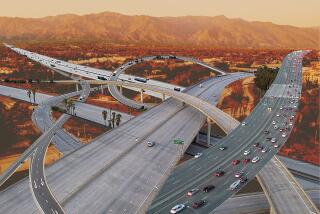With Babies on Board, Parents Learn to Play It Safe
- Share via
The longest drive of my life occurred on the day my husband and I brought our firstborn home from the hospital. It was a route we had taken, oh, several million times before, unthinking, intent only on avoiding left-hand lane backup, blithely unaware of the chaos that surrounded us--the potholes, the bicyclists, the bleating horns, the zoned-out delivery truck drivers, the enveloping exhaust fumes. These were all white noise, the ambience of driving in Los Angeles.
Until we put our 5-day-old child in the car.
Suddenly, we were entering an unfamiliar landscape, fraught with danger. Every brake light seemed a portent of disaster; every passing SUV contained a madman. In the driver’s seat, my husband’s neck and shoulder muscles clenched with the tension as he growled and swore, then checked himself, glancing into the rearview mirror to see if the baby had heard. In the back, I clutched the securely fastened car seat as if it might fly out the window at any moment, leaning most of my body over my son, to protect him from shrapnel or flying glass. It was as if we were driving amid the dropping bombs behind enemy lines--or at least on the Autobahn.
Two years later, when we brought our daughter home, the drive was a bit more sane--or, rather, we had gotten used to the change that comes over many of us, as drivers, the day we become parents.
The effect of parenthood on driving is very complicated, providing at once the world’s greatest driving distraction: a screaming or babbling or, even worse, suddenly silent child and--the best reason for not getting distracted--that same child. In the early years, parents live in an often hallucinatory haze of exhaustion (not necessarily the most desirable condition for driving), and yet there are suddenly many more reasons to be driving: trips to the diaper, er, grocery store, visits to the pediatrician, midnight jaunts around the neighborhood in an effort to lull the precious bundle to sleep.
Parenthood also changes your relationship with other drivers--a car that cuts you off or slides through a red light represents not a motorist making a bad choice, but a self-absorbed clod who has very nearly killed your child. I find myself giving these potential clods plenty of room; where once I might have engaged in a bit of freeway posturing, now I just lie low, let the line-cutter in, let that tailgater pass. Because now, more than ever, driving is not about making a point--it’s about getting there safely.
“Safe” has become one of my all-time favorite words. Where once I flung it about with disdain--”Oh, you’re just taking the safe position”--now I light candles and offer prayers to it. As many have observed before, parenthood has a way of scooping up the concept of mortality and laying it right where you see it first thing in the morning. There it is: I am going to die. And my children are going to die. All I can do is everything in my power to ensure that it happens in this order, and approximately 100 years hence.
This mandate is never clearer than when I am behind the wheel. Driving is a potentially fatal activity that we engage in every day. We are reminded of this constantly--whenever a plane crashes, or a natural disaster occurs, whenever murder statistics are tallied, the comparison with automobile-related deaths is inevitably made. Cars always win.
If I think about this too much, I begin to form a life plan that involves moving my family to Pennsylvania Dutch country--I have always admired the sleek lines of the Amish buggy. So I try not to think about it too much. Just enough to remind myself to drive as gently as I can--because there are babies in my car, and in many of the cars around me.
*
Mary McNamara can be reached at mary.mcnamara@latimes.com.



